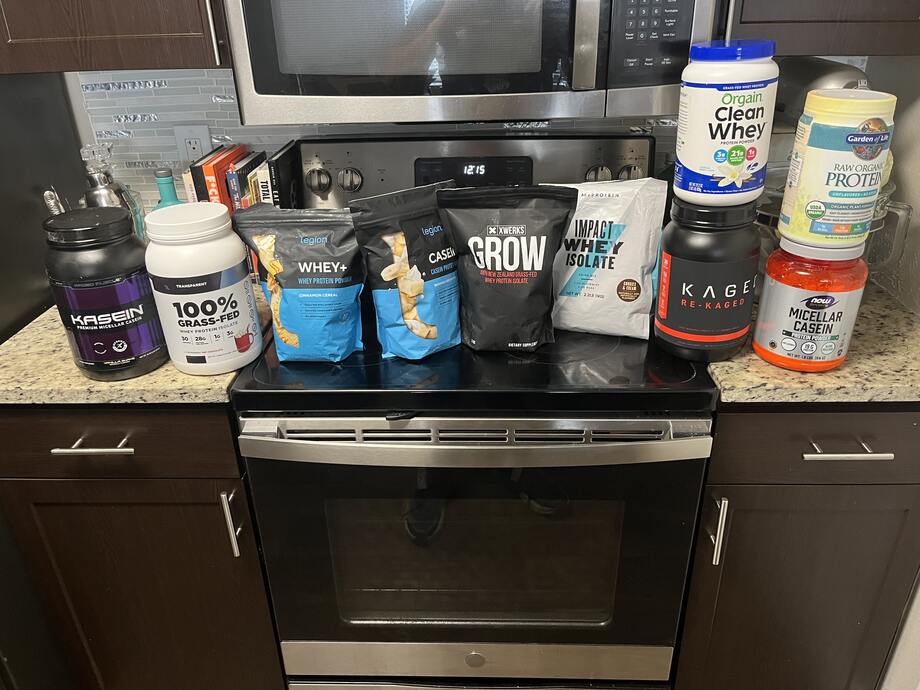We test and review fitness products based on an independent, multi-point methodology. If you use our links to purchase something, we may earn a commission. Read our disclosures.
Protein powder is a popular supplement for building muscle, losing weight, gaining weight, and for people who struggle to get enough protein through food. With so many options on the market, choosing the best protein powder for your needs can be confusing, frustrating, and downright overwhelming.
Protein powders differ in how they’re processed, their source, macronutrient profile, ingredients, and how helpful they are for specific fitness goals. In this post, we’ll discuss popular types of protein powder, their benefits, how they differ, and how to choose the best one for your body.
Medical disclaimer: This article is intended for educational and informational purposes only. It is not intended as a substitute for medical advice. For health advice, contact a licensed healthcare provider.
What is Protein Powder?
Protein powder is a dietary supplement used to increase the proportion and amount of protein in the diet.
RELATED: How Much Protein Do I Need?
Protein is one of the three macronutrients, along with fat and carbohydrates, essential for good health and proper functioning of the body. When we eat protein, it’s digested into smaller building blocks called amino acids. These amino acids are used for a variety of functions such as building and maintaining muscle, muscle recovery, producing enzymes and hormones, providing energy, and regulating the immune system.
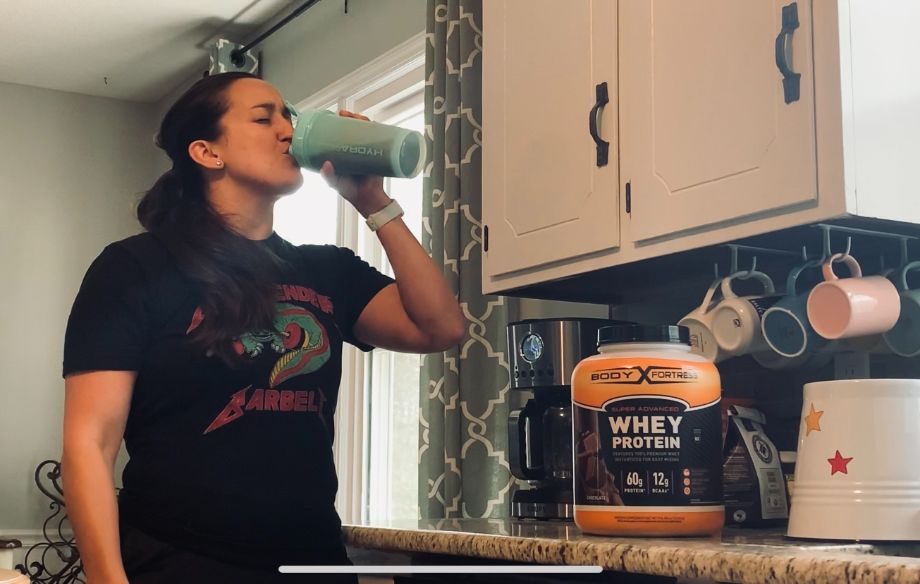
Protein powder can be made from a variety of sources. Milk is used to produce whey and casein protein powders, while plant-based sources can also be used.
Because of the way they’re processed, protein powder supplements consist primarily of protein with low amounts of fat and carbs.
Types of Protein Powder
Most protein powders can be classified as either a protein concentrate or a protein isolate. The major differences between these two types of protein powder arise as a result of how they’re processed.
Protein concentrates are produced by “concentrating” the protein from food by removing excess liquid, filtering out most of the fats and carbohydrates, and spray-drying the resulting product into a dry powder, with the exact production method varying based on the source.
Protein isolates, on the other hand, are usually made up of at least 90% protein and are lower in fat and carbohydrates than concentrates.
Whey Protein
Whey protein is considered by many to be the gold standard in terms of its effectiveness for building muscle. This is because whey is a complete protein, containing all nine essential amino acids in optimal proportions for building muscle.
Whey is a byproduct of the cheesemaking process, which involves taking cow’s milk and adding acid or rennet, which separate it into solid curds (used for cheese) and liquid whey. Whey is used to make three different varieties of whey protein powders.
Whey Protein Concentrate
Whey protein concentrate is made by removing excess liquid from whey, filtering out most of the fats and carbohydrates, and spray-drying the resulting product into a dry powder.
According to the USDA1, whey protein concentrate can contain anywhere between 25% to 89.9% protein. It contains lactose as its primary carbohydrate, so it usually isn’t tolerated very well by people with lactose intolerance.
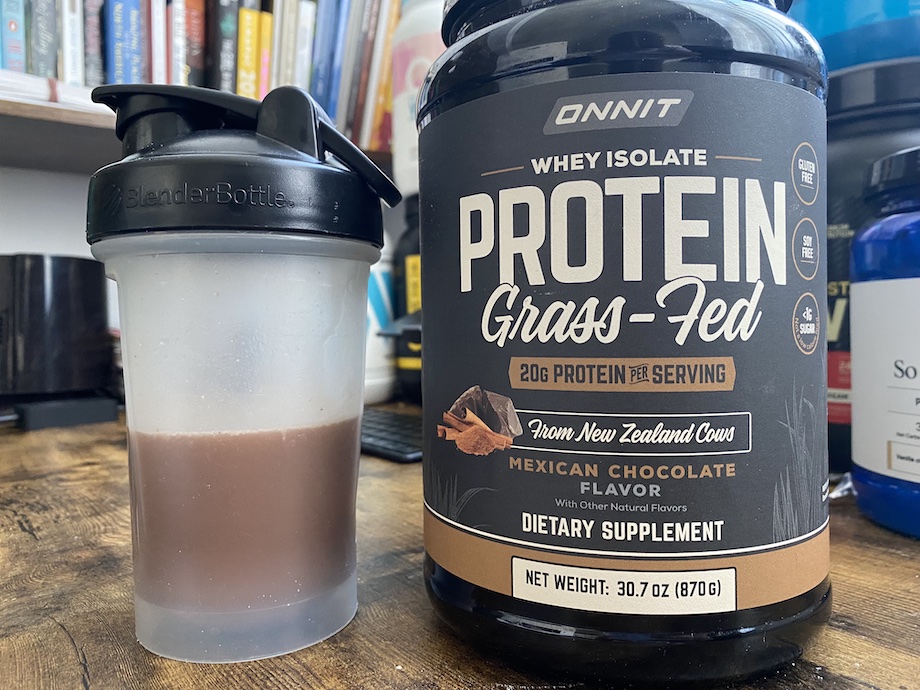
Whey Protein Isolate
The process of making whey protein isolate involves additional filtration to remove even more fats and carbohydrates. This creates a higher quality, higher protein product containing at least 90% protein.
Whey Protein Hydrolysate
Whey is a relatively large protein. Some products take whey concentrates or isolates and break the proteins up (or “hydrolyze” them) into smaller chains of amino acids.
Compared to concentrates or isolates, hydrolysates require less digestion by the body. It’s theorized that hydrolysates may raise amino acid levels in the blood faster and potentially stimulate muscle growth better, although a September 2009 review published in Nutrition & Metabolism found conflicting results3.
Interestingly, a small but more recent May 2019 study published in the Journal of Nutrition found that whey protein hydrolysate and intact whey protein were equal in their ability to raise levels of amino acids in the blood and stimulate muscle protein synthesis4. The hydrolysate was better at getting the branched-chain amino acid leucine into muscles, but the overall impact of these two protein powders for muscle were about the same.
Casein Protein
Like whey, casein is also a byproduct of cheesemaking. Casein-rich curds are separated from the whey and are dried into a powder.
Casein is digested and absorbed into the bloodstream much more slowly than whey, making it less efficient for stimulating muscle protein synthesis post-workout.
However, the slow digestion of casein makes it a popular choice for supporting muscle growth and recovery overnight. This is supported by the International Society of Sports Nutrition, who advise that drinking 30 to 40 grams of casein protein before bed can increase muscle protein synthesis5.
Egg Protein
Egg protein powder is made from dried egg whites and, like whey, is considered a complete protein. Despite this, it hasn’t been researched as well as whey has for its ability to promote muscle building, so it’s difficult to say whether egg protein is as effective.
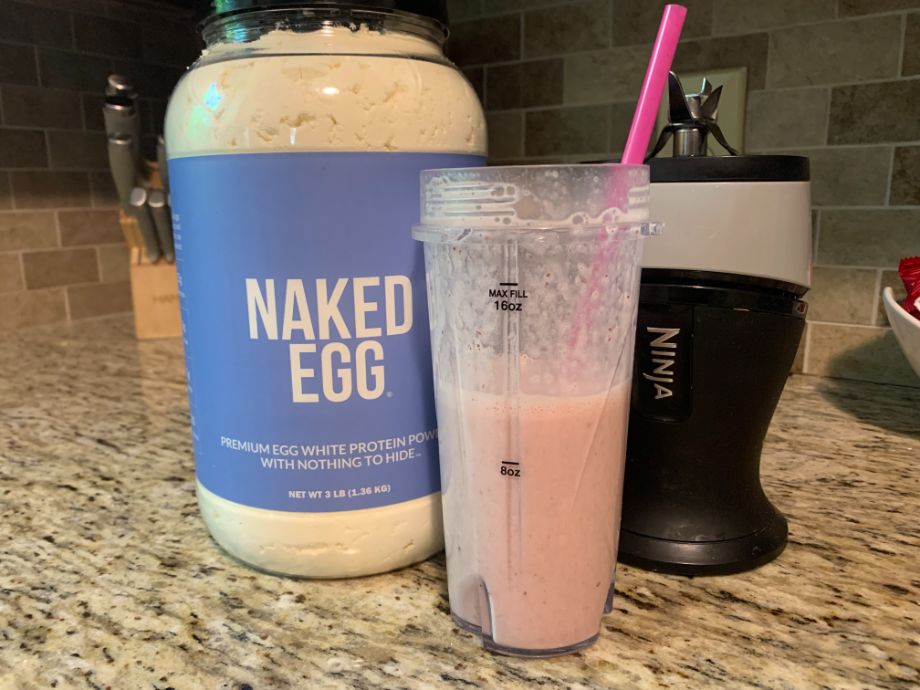
Based on the research we do have, the authors of a July 2022 review published in Nutrients suggested that consuming 20 grams of egg white protein may be helpful for body composition, strength, and power when getting enough total dietary protein during the day6.
RELATED: Best Keto Protein Powder
Plant Proteins
Plant-based protein powders are becoming more and more popular thanks to the health, environmental, and animal welfare-related benefits that many plant-based foods offer.
RELATED: Plant-Based Protein Powder Benefits
Plant proteins can be made from many different plant-based foods. To get an idea of how many plant-based protein options are available, we’ve listed just a few sources below:
- Soy
- Hemp
- Chia seeds
- Alfalfa
- Artichoke
- Quinoa
- Pea
- Brown rice
- Flaxseed
- Pumpkin seeds
- Watermelon seeds
- Sunflower seeds
- Sesame seeds
Plant-based protein powders may contain a single source of protein or be formulated as a protein blend. Complete proteins such as soy, quinoa, chia, and hemp are often used alone because they already provide ideal proportions of all nine essential amino acids.
Essential amino acids aren’t produced by the body, so it’s “essential” that we get enough through our diet.
Some plant-based foods, however, don’t provide ideal proportions of all the essential amino acids. Pea protein, for example, is lower in methionine, while brown rice protein is lower in lysine. When combined as a protein blend, these complementary proteins provide a balanced amino acid profile.
RELATED: Best Vegan Protein Powder
We’ll discuss a few of the most popular plant-based proteins in more detail below.
Soy Protein
Soy protein is made from soybeans and has long been a popular choice thanks to its status as a complete protein. Research suggests that its ability to support muscle building may be almost equal to that of whey.
Supporting this, a May 2020 randomized controlled trial published in the International Journal of Environmental Research and Public Health found no differences in strength or muscle mass between participants who took soy versus whey when the protein powders contained the same amount of leucine7.
Pea Protein
Pea protein is made from yellow split peas. It’s less allergenic than soy and many people find it to be easily digested. It isn’t a complete protein on its own, so it’s often combined with a complementary protein source like brown rice.
RELATED: Best Pea Protein
Compared to soy, research on the benefits of pea protein are more limited. A January 2015 randomized controlled trial published in the Journal of the International Society of Sports Nutrition and a small January 2019 study published in Sports both found no differences between pea and whey in how well they supported building muscle, although more research would be helpful to confirm this8,9.
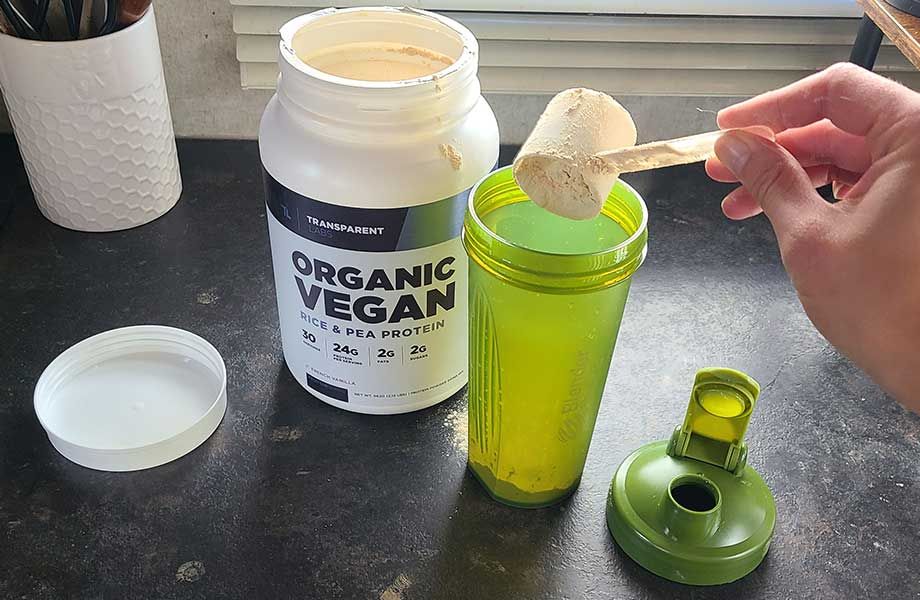
Brown Rice Protein
Brown rice protein contains about 80% protein and is an allergy-friendly option for people allergic to soy or peas, but isn’t a complete protein.
There isn’t much research on brown rice protein for supporting fitness goals, but a small June 2013 study published in Nutrition Journal found that 48 grams of whey versus rice protein isolate were about equal in terms of improving muscle mass, strength, power, and overall body composition when combined with resistance training10. A normal serving of protein powder is about 20 grams, so it’s possible that you might need more brown rice protein to be as effective as whey or soybean protein for fitness.
Hemp Seed Protein
Hemp protein is another popular complete plant-based protein. A nice benefit of hemp protein powder is that it provides anti-inflammatory omega-3 fatty acids.
However, a concern raised by an August 2018 study published in Amino Acids11 is that unlike soy, pea, and brown rice protein, hemp protein doesn’t meet the World Health Organization’s recommendation for leucine content.
This could mean that hemp seed protein may not be as effective as other plant proteins for building muscle, although more research is needed to say for sure.
Do You Need Protein Powder?
Most people can easily meet their protein needs through well-balanced, nutrient-dense meals that include high-protein foods even when engaging in regular exercise.
People involved in more intense physical activity and who prioritize building muscle, however, have higher protein needs than the average person. Athletes, bodybuilders, and powerlifters with specific body composition or performance goals can particularly benefit from protein powders.
It can be difficult to get enough high-quality protein through food alone since many foods provide a combination of macronutrients. A bodybuilder close to competition who is relying only on whole foods will likely end up consuming too many calories because of the fat and carbohydrates naturally present in many foods.
How Much Protein Is Enough?
The Recommended Dietary Allowance (RDA) for protein is 0.8 grams of protein per kilogram of body weight. This is the average amount recommended for the general population to avoid protein deficiency.
With increasing physical activity, however, your protein needs will increase. Research supports the following protein intakes for different contexts (expressed per kilogram of body weight):
- Building muscle: 1.2-1.7 g
- Weight loss/fat loss: 1.6-2.4 g (people who are overweight or obese may benefit from less, between 1.2-1.6 g)
- Older adults: 1-1.2 g
Which Protein Powder is Best for Me?
When choosing a protein powder, consider factors such as your health and fitness goals, dietary and flavor preferences, and budget.
Nutritional Information
Most important is the protein content of any protein powder. While most provide around 20 to 25 grams per serving, some provide less than this. Think about how much protein you need to support your goals and choose accordingly.
Different products have varying amounts of fat and carbohydrates, although they’ll typically be relatively low. A common source of added fats is medium-chain triglycerides (MCTs), and added sugars will increase the carbohydrate content. If you have strict dietary goals, you may want to limit these types of ingredients. On the other hand, you may want these additional ingredients if you’re trying to gain weight.
RELATED: Best Protein Powder for Weight Gain
Dietary Preferences
Whey isolates and hydrolysates are lower in lactose than whey protein concentrates, so they may be better tolerated by people with lactose intolerance.
Vegans and people following plant-forward diets would obviously want to choose a plant-based protein powder. Plant-based proteins are also good choices for people with milk allergies or who prefer more environmentally-friendly options.
Price
It’s a fact—protein powders can be pricey. Concentrates are typically more affordable than protein isolates or hydrolysates, but the trade-off is that they’re not quite as high in protein.
Bulk protein powders that are unflavored and don’t have any additional ingredients can also be good options to save money, but they may not mix into liquids as well or taste quite as nice.
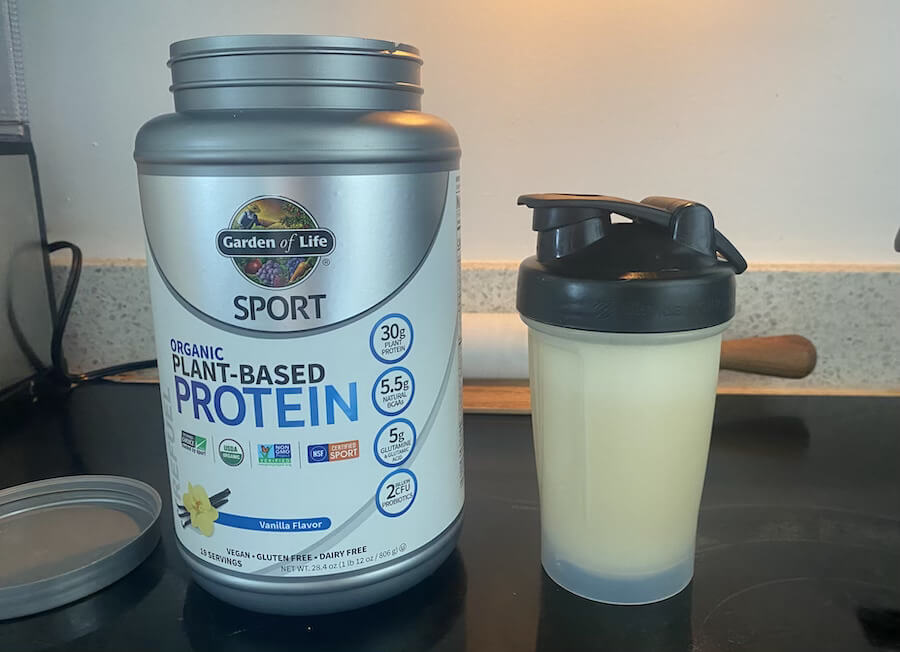
Ingredients
Protein powders often have ingredients such as artificial sweeteners, sugar, digestive enzymes, and medium-chain triglycerides added to them for improved flavor, texture, and nutrition, so it’s important to read the product label in case you prefer to avoid any of these.
RELATED: Best Clean Protein Powder
Micronutrients
An added benefit of some protein powders is their mineral content. They can provide small but meaningful amounts of calcium, B vitamins, potassium, phosphorus, magnesium, and iron, with the amount and types of minerals differing based on the protein source.
Taste
Flavor can definitely be a dealbreaker when it comes to protein powders. Even classic flavors like chocolate or vanilla can vary across brands, so you may need to try a few different products before finding one you love.
RELATED: Best-Tasting Protein Powders
Types of Protein Powder: Final Thoughts
We have more choices than ever when it comes to protein powder, and all of them can help with meeting your daily protein goals with many options for dietary restrictions.
Whey and soy are both well-studied for their muscle-building benefits, while casein may be particularly suited for building muscle overnight. The benefits of other plant-based proteins for muscle aren’t as well-researched, so choosing a blend of complementary plant proteins is probably wise.
Looking for recommendations? Luckily, we’ve done the hard work for you and come up with our favorite picks for each type of protein powder:
- Best Whey Protein Powder: Kaged Whey Protein Isolate
- Best Casein Protein Powder: Legion Casein+
- Best Egg Protein Powder: Naked Nutrition Egg Protein Powder
- Best Plant-Based Protein Powder: Vega Sport Premium Protein
- Best Pea Protein Powder: Naked Nutrition Pea Protein
- Best Brown Rice Protein Powder: Transparent Labs Organic Vegan Protein Powder
- Best Hemp Seed Protein Powder: Manitoba Harvest Hemp Yeah! Max Protein
- Best Soy Protein Powder: Bulk Supplements Soy Protein Powder
Types of Protein Powder: Q&A
What are the three types of protein powder?
Protein powders exist in three forms: isolates, concentrates, and hydrolysates.
What are the 2 types of protein powder?
The two primary types of protein powder are protein isolates and protein concentrates.
Are there different types of protein powder?
Protein powder comes in many varieties depending on which food was used as the source from which the protein was taken. Protein powders can use animal-based proteins like whey and casein or plant-based sources like soy, peas, brown rice, and hemp.
What is the best protein type?
The best protein powder for you will depend on your dietary and taste preferences, budget, and fitness goals. Whey and soy have been shown to be incredibly effective for building muscle, while any protein powder will help you meet your daily protein needs.
These statements have not been evaluated by the Food and Drug Administration. This product is not intended to diagnose, treat, cure, or prevent any diseases.
References
- United States Department of Agriculture. USDA specifications for dry whey protein concentrate. Accessed May 10, 2023.
- Manninen AH. Protein hydrolysates in sports nutrition. Nutr Metab (Lond). 2009 Sep 28;6:38. doi: 10.1186/1743-7075-6-38. PMID: 19785737; PMCID: PMC2761917.
- Moro T, Brightwell CR, Velarde B, Fry CS, Nakayama K, Sanbongi C, Volpi E, Rasmussen BB. Whey Protein Hydrolysate Increases Amino Acid Uptake, mTORC1 Signaling, and Protein Synthesis in Skeletal Muscle of Healthy Young Men in a Randomized Crossover Trial. J Nutr. 2019 Jul 1;149(7):1149-1158. doi: 10.1093/jn/nxz053. PMID: 31095313; PMCID: PMC7443767.
- Kerksick CM, Arent S, Schoenfeld BJ, Stout JR, Campbell B, Wilborn CD, Taylor L, Kalman D, Smith-Ryan AE, Kreider RB, Willoughby D, Arciero PJ, VanDusseldorp TA, Ormsbee MJ, Wildman R, Greenwood M, Ziegenfuss TN, Aragon AA, Antonio J. International society of sports nutrition position stand: nutrient timing. J Int Soc Sports Nutr. 2017 Aug 29;14:33. doi: 10.1186/s12970-017-0189-4. PMID: 28919842; PMCID: PMC5596471.
- Puglisi MJ, Fernandez ML. The Health Benefits of Egg Protein. Nutrients. 2022 Jul 15;14(14):2904. doi: 10.3390/nu14142904. PMID: 35889862; PMCID: PMC9316657.
- Lynch HM, Buman MP, Dickinson JM, Ransdell LB, Johnston CS, Wharton CM. No Significant Differences in Muscle Growth and Strength Development When Consuming Soy and Whey Protein Supplements Matched for Leucine Following a 12 Week Resistance Training Program in Men and Women: A Randomized Trial. Int J Environ Res Public Health. 2020 May 29;17(11):3871. doi: 10.3390/ijerph17113871. PMID: 32486007; PMCID: PMC7312446.
- Babault N, Païzis C, Deley G, Guérin-Deremaux L, Saniez MH, Lefranc-Millot C, Allaert FA. Pea proteins oral supplementation promotes muscle thickness gains during resistance training: a double-blind, randomized, Placebo-controlled clinical trial vs. Whey protein. J Int Soc Sports Nutr. 2015 Jan 21;12(1):3. doi: 10.1186/s12970-014-0064-5. PMID: 25628520; PMCID: PMC4307635.
- Banaszek A, Townsend JR, Bender D, Vantrease WC, Marshall AC, Johnson KD. The Effects of Whey vs. Pea Protein on Physical Adaptations Following 8-Weeks of High-Intensity Functional Training (HIFT): A Pilot Study. Sports (Basel). 2019 Jan 4;7(1):12. doi: 10.3390/sports7010012. PMID: 30621129; PMCID: PMC6358922.
- Joy JM, Lowery RP, Wilson JM, Purpura M, De Souza EO, Wilson SM, Kalman DS, Dudeck JE, Jäger R. The effects of 8 weeks of whey or rice protein supplementation on body composition and exercise performance. Nutr J. 2013 Jun 20;12:86. doi: 10.1186/1475-2891-12-86. PMID: 23782948; PMCID: PMC3698202.
- Gorissen SHM, Crombag JJR, Senden JMG, Waterval WAH, Bierau J, Verdijk LB, van Loon LJC. Protein content and amino acid composition of commercially available plant-based protein isolates. Amino Acids. 2018 Dec;50(12):1685-1695. doi: 10.1007/s00726-018-2640-5. Epub 2018 Aug 30. PMID: 30167963; PMCID: PMC6245118.
Further reading

Looking for some excellent fitness gifts for mom? We have great ideas from high-tech to low-cost presents. Read more

Why incorporate eccentric training into your workouts? A certified personal trainer explains the benefits and how to do it. Read more

Looking for a ProForm promo code? The Garage Gym Reviews team has you covered with the best options to save you cash. Read more

Knowing how to clean rubber gym floors is a key part of keeping your home fitness center in top shape. Get tips and tricks from our experts. Read more

